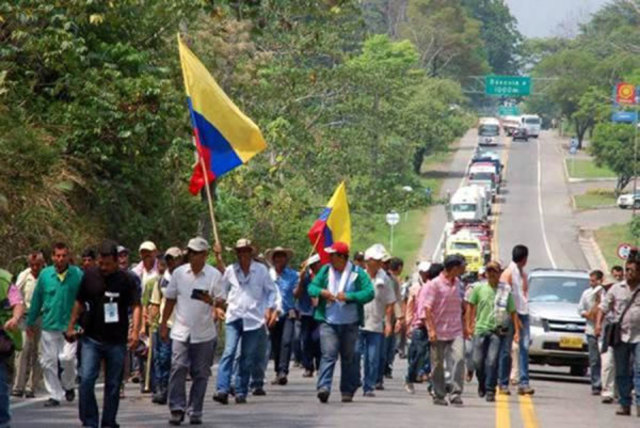
Víctor Barrera
This piece has been translated from an original article published in La Silla Vacia, available here.
The article discussed in the piece, “From local turn to space-relational analysis: Participatory peacebuilding in a Colombian borderland,” can be found here.
The newly elected Colombian national government announced that societal participation will underscore, legitimise and energise the construction of a total peace with all violent actors. In his inaugural speech, President Gustavo Petro stated that his central strategy for ending violence would encompass all of the country’s diverse regions because “it is society as a whole that must dialogue on how not to kill each other.”
This proposal aligns with the consensus among practitioners, experts and decision-makers that total peace must be local, bottom-up and underpinned by the principles of participation and inclusivity. But those who subscribe to this view differ in their interpretation of the form, scope and purpose of participation across varied peacebuilding efforts.
An article I recently co-authored with Magda López, Henry Staples and Miguel Kanai identifies some of the key dilemmas underlying citizen participation in peace by studying the interaction between multiple institutional and extra-institutional modalities of participation in the Catatumbo region during the negotiation and implementation of Colombia’s 2016 Peace Agreement. The results of our analysis offer salient lessons for the current situation in Colombia and problematise several of the assumptions that animate the participatory impetus of those who support the idea of peace built from and for the regions.
Tensions Between Different Forms of Participation
The first element we highlight is that not all forms of participation align with each other. Sometimes, the most effective forms of participation can be the most divisive, both within communities and between communities and local and national elites. This can hinder the coordination necessary to take advantage of other forms of participation at a later stage.
In the Catatumbo region, we observed that in 2013, protests were a powerful mechanism employed by coca farmers in their search for a peace beyond silencing the guns. Participants successfully influenced the government’s dialogue with the Revolutionary Armed Forces of Colombia—People’s Army (Fuerzas Armadas Revolucionarias de Colombia—Ejército del Pueblo – FARC-EP) in Havana, Cuba, and scaled-up their political action by securing historic commitments for socio-economic investment from the national government.
Yet, these protests caused divisions with other sectors in the region. Traders, transporters and city-dwellers who initially sympathised with farmers’ demands eventually distanced themselves from the protests. Several people mentioned to us that the unrest caused by the protests hampered the translation of this social force into an attractive alternative electoral option. Ultimately, this compromised more solid and sustained regional collective action by prohibiting the possibility of garnering wider support among those residents who were indifferent to the 2016 Peace Agreement, or even saw it as an inconvenience.
The Type of Participation and Preference Change
If, as outlined above, participation of one sector can rival participation of others, we also find situations in which the same social sector expresses differing positions depending on the space in which participation takes place. In other words, preferences around peace adapt to the incentives and logics emanating from each type of participation. This is important because one of the most entrenched assumptions of local peace assumes that those who engage do so in a consistent and stable way.
In our analysis, we found that despite remaining cohesive in protesting and negotiating with the national government in 2013, tensions emerged among campesinos when voting in the 2016 peace referendum and especially in the national (2018) and local (2019) elections.
“We are an organisation of more or less 10,000 people. But here you find campesinos who vote for the Conservative Party…, who are now with the FARC party… In 2013, thousands of us marched… but those thousands don’t vote for a real political alternative.”
Interview with a social leader, May 2020
This testimony points to the weight that party traditions have at the local level as well as to a regional electorate that knows how to play strategically; seeing in these structures the opportunity to resolve specific and urgent problems. All of this raises inter-temporal tensions in the ways in which people decide to participate in peacebuilding processes: sometimes favouring more limited and immediate interests, whereas in other cases promoting broader proposals for change in the medium and long term.
From Scales of Participation to Decision-Making
Another factor that affects participatory peacebuilding processes is the geographical scale. Here, tensions arise from the difficulty of aggregating preferences from micro-spaces of participation to macro-scales of decision-making. The problems identified at vereda [village] level do not necessarily correspond to those identified at the municipal and regional scales. This is best demonstrated by the flagship participatory experiment of the 2016 Peace Accord: the Development Programmes with a Territorial Approach (Programas de Desarrollo con Enfoque Territorial – PDET) that Theresa Bahmann discussed earlier on this blog.
Over 8,000 people participated in the Catatumbo PDET process. Dissatisfaction emerged with this experience as many felt the regional Plan for Transformation did not adequately reflect discussions held at the village level. This dissatisfaction was compounded by a growing unease among the population around national decisions regarding regional development that contravened what had been agreed in these earlier, local spaces for participation.

Participation Is Costly
These tensions and dilemmas warn us that participatory processes which directly or indirectly shape peacebuilding outcomes are not of unbridled benefit. The differentiated impacts of war, the nature of armed groups that control or dispute territory and the organisational ecology of civil society affect the ways in which peace is understood and practised among different social groups, among the same social group at different times, according to different forms of participation, and at different geographical scales.
The discussion above does not suggest that we should return to watertight peacebuilding processes. The point instead is that total peace requires a conscious and careful design to define what kind of participation should be promoted, at what point in the negotiation or implementation and through what institutional and/or social mechanisms. The risks of a poor design are considerable, especially in circumstances such as those in Colombia, where the civilian population continues to face significant security challenges in many regions, coupled with the ongoing threat to the capacities of civil society organisations due to the systematic assassination of social leaders.
Acknowledging the challenging, and even tragic, outcomes of Colombia’s 2016 Peace Agreement, researchers, policymakers and practitioners must find ways to align institutional and social modes of engagement in peace processes and encourage critical debate on the unchecked assumptions about the benefits of participation. This is an essential starting point to achieving the ‘total peace’ to which President Gustavo Petro now aspires.

